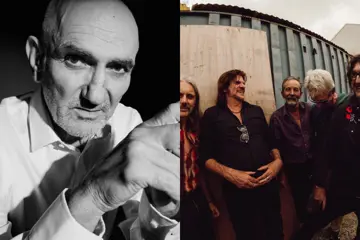 Sleep
SleepIn 1998, Sleep released a version of an hour-and-three-minute song that would go on to earn them a place in the hearts of an entire generation of bleary-eyed metalheads. But before Dopesmoker would ever see the light of day, Sleep had broken up. Funnily enough, the major label they were signed to at the time were not super stoked to market an album that consisted solely of an hour-and-three-minute song and the resulting tensions led to the trio parting ways.
But as the years went on, the legacy of Sleep continued to grow. In part this was helped by the original trio’s success in their post-Sleep outfits – guitarist Matt Pike’s fire-breathing dude metal group High On Fire and the remaining duo’s transcendental drone outfit Om. Sleep’s following would also expand as more and more people got the chance to listen to Dopesmoker. Different versions of the record would be released and limited edition reissues would make it something for record collectors to covet. Throughout the noughties, the cult of Sleep would slowly spread, like a cloud of smoke in a room with all the windows closed, slowly affecting all those lucky enough to encounter it.
"We’ve never cared about all the extraneous shit."
But according to Al Cisneros, the man responsible for the ferociously bellowed vocals throughout Sleep’s catalogue, the band’s decision to reform for two shows at an English All Tomorrow’s Parties festival in 2009 wasn’t about cashing in on the cult fandom they had garnered. Nor was it about achieving the success they always thought they deserved after writing Dopesmoker – an album that is, arguably, one of the most iconic extreme metal albums of the 1990s. “We’ve never cared about all the extraneous shit [that happened after Dopesmoker was finally released]. We have, and continue to, make the music we want to hear. Not many bands on major labels record hour-long songs. We didn’t expect it to be received as it has. That’s awesome if people like the music but we are simply grateful to play music, write songs,” Cisneros says.
Discussing Sleep with Cisneros and Roeder, it becomes very clear that the trio of Sabbath worshippers holds three things very dear to their creative process. First and foremost is the Riff, which is always spelt with a capital to display due reverence. The second is marijuana. And the third is creative freedom. Cisneros says the band has always been motivated to go wherever the Riff compels them to. Little else matters besides being in a position where they jam on whatever idea they want to jam on. To that end, the band works to rid themselves of preconceptions about what they would like to do with their music, or what their music needs to be like.
Roeder, who plays in Sleep when he’s not busying himself playing drums for Neurosis, sums up the ethos of the band perfectly when he suggests, “Sleep is somewhat of a refuge for all of us. No pressures or expectations. We are taking it one day at a time really. The decision to move forward is that we just love to play music together. That’s at the core of it. We intend to keep it untamed.”
Though Sleep have been moving forward since reforming, they have been doing it really, really, slowly. Some of that stemmed from their uncompromising creative outlook, and some of it was the product of the band’s circumstance. After playing their first two shows together in over a decade in 2009, original drummer – and Cisneros’ partner in the two-piece Om – Chris Hakius decided to leave the music business behind to focus on family life. When they could have easily played the two shows and called it quits, further enhancing the thick aura of lore surrounding Sleep, Cisneros and Pike decided to recruit long-time friend Jason Roeder to sit behind the kit. From there the band would play sporadically for another two years before announcing themselves as a “full, reunited band”. At this time it became apparent just how organically the second incarnation of Sleep was going to evolve. Beyond being busy with their other projects, these were three musicians in no rush to put out a full-length or embark on a world tour. Instead, they preferred build their rapport into a musical chemistry. “I think it fell into place quite naturally,” Roeder says. “When Al called me and asked if I wanted to play shows with Sleep, it was like, ‘Uh... yeah. That’s completely logical. Onward’.”
“Agreed,” Cisneros concurs. “Jason saw the entire evolution of the band from the Gilman days to London Records. There is still a tonne of music in us all and the work is just getting started… Looking forward to next band practice and shows.”
Discussing the music residing within the three parts of Sleep, the conversation again veers towards Dopesmoker. By most accounts a truly genre-defining monolith of an album, has the band’s reluctance to release anything besides a single as part of this year’s Adult Swim Summer Singles Program been in part due to the fact that the last album they released, 16 years ago, ranks so highly on so many people’s all-time favourite albums list? No, apparently. “It’s neat that the album means so much to people but I see music as a moving process, not to be stuck but always be moving. Like an ascending spiral rather than going over the same ground over and over,” Cisneros says.
With The Clarity, Sleep have indeed pioneered new ground. Not only is it the band’s first official recording with Roeder, but it also showcases a sound that’s less hazy than what was captured on Dopesmoker. It was also put out by a cartoon television channel, which is kind of weird. “They offered us some recording money and a simple idea: we put out a free song for you and you make it whatever you want it to be. If only record labels operated the same way years ago,” Roeder says of how things went down when the band was doing The Clarity.
"After all the obstacles Sleep faced, just being able to simply play music, write songs, is its own reward."
The just shy of ten-minute track has Sleep fans the world over salivating at the prospect of what’s coming next. The Clarity updates Sleep’s sound by adding traces of High On Fire and notes of Cisneros’ doom metal supergroup Shrinebuilder. It’s as slow and heavy as ever, but notes of the technicality learned over nearly 20 years can also be heard. All of which serves to make the band’s slavish legion of fans want to know where the band is going next even more. But Sleep aren’t pandering to their fans about when anything is going to be ready. Though there have been reports that a full-length is in the works, when Cisneros and Roeder sit down to talk to The Music they’re keeping their cards close to their chests. “It will happen organically, and only when/if it’s ready. We all respect the Riff and know not to force our will upon it,” Roeder says about when fans will hear album number four from Sleep. “We are careful not to place too much in front of us or announce anything until it’s ready to go. It’s less stress and it lets us be present and enjoy playing as we go… The Riff decides, Sleep obeys.”
Cisneros adds, “Yeah – we all know if a song is complete. The process is actually the goal. Then you end up with songs eventually. The Iommic path makes itself clear. Attention must be paid during the process then songs automatically evolve.”
You better get comfortable on your favourite couch, because you might have to wait a while for the sequel to Dopesmoker. Cisneros says, after all that the highs (pun intended) and lows Sleep have had to traverse over their rocky career in the 1990s, it feels fine to just be able to hang out and jam with buddies. “After all the obstacles Sleep faced, just being able to simply play music, write songs, is its own reward.”















